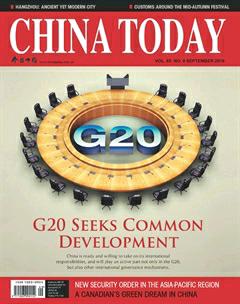2016 G20 Summit–The China Moment
By staff reporter ZHOU LIN
THE 11th G20 Summit, themed “Toward an Innovative, Invigorated, Interconnected and Inclusive World Economy,”was held in Hangzhou, a city renowned for its rich history and innovations, on September 4-5. This was the fi rst time China took the G20 rotating chair.
Whats the history of the G20? What role does it play in global economic governance? What are the relations between it and China? The book explains all. The Chongyang Institute for Financial Studies, a think tank named one of the top 150 Global Superb Think Tanks in the 2014 Global Go To Think Tank Index Report released by the University of Pennsylvania, invited 84 former politicians, bankers and scholars from over 10 countries as its senior researchers. It also conducted substantial cooperation with 30-plus think tanks worldwide. This book is the result of the collaborations. In the preface, Why the G20 Is Still Important, the executive director of the institute, Wang Wen, says the global economy has fallen into a new lowgrowth trap in the second decade of the 21st century. There are several reasons for this. First, the stagnation in global economic growth is seriously undermining development in various countries. Second, the anticipation of a US Federal Reserve interest rate hike is hanging over the economy like the “sword of Damocles.” Third, major currencies have depreciated against the US dollar, causing substantial fl uctuations in exchange rates. Fourth, trade protectionism is once more gaining ground the world over, and the functionality of the economic growth engine has been reduced.
Against such a backdrop, the 2016 G20 Summit has the same importance as in 2008, year of the global fi nancial crisis. All member countries have to build a long-term mechanism to jointly handle the challenge of global economic governance.
The book consists of six chapters and six appendices. The fi rst three chapters give an introduction to the G20 while the last three focus on the blocs deliberations.
Chapter one introduces the historical backdrop and current reality of the G20 while the second chapter outlines its major agendas. The third chapter discusses the mechanism of the G20 and its role in the global governance system. The fourth refl ects on the background and fundamental concept of global economic governance, while the fi fth focuses on the G20 global governance operation. The fi nal chapter contains thoughts on the relations between the G20 and China in 2016.
The appendices include further references: introducing the G20 member states, detailing the time and places where previous G20 Summits were held and the communiqués issued; the G20 policy pledge and its implementation; and the G20 organizational structure. The appendices also explain some G20 terminologies and include recommendations for the 2016 summit from more than 40 think tanks in over 20 countries.
At the “G20 and China”conference held by the Chongyang Institute, Paul Martin, former Canadian Prime Minister, also dubbed “the father of the G20,” talked of his expectations of the 2016 summit. He expressed hope that China would utilize the platform to build a more rational global economic governance mechanism to serve all 20 member states as well as the whole world. Martin also advised China to set up agendas with a global vision.
Considering that each na- tion has its own culture, historical background and interests, it takes time to achieve an agreement among different stakeholders. China, therefore, has the signifi cant mission to eliminate misunderstandings and reach an acceptable agreement.
As the new president of the G20, China needs to put forward solutions for a series of important issues. These include exploring new ways for robust, sustainable and balanced growth, furthering global economic governance system reforms, perfecting a global infrastructure initiative, innovating trade and investment methods, and realizing a more inclusive pattern of development. All this calls for innovations on the theme, organization and arrangement of the G20 Summit.
Priority should be given to constructing a new economic growth framework. Second, it is necessary to establish a global economic coordination system. Finally, the G20 should perfect a multi-unit governance cooperation mechanism. The B20(Business 20), T20 (Think Tank 20), C20 (Civil Society 20), W20 (Women 20) and other forums that have evolved out of the G20 have provided wonderful cooperative platforms for governments, enterprises and social organizations.
China can suggest more balanced ideas for global governance. The methodology of Chinas “Four-Pronged Comprehensive Strategy” guiding domestic governance could be transposed to global governance. That would mean a multi-tasking strategy that takes into consideration four major factors: objectives, means, a guarantee mechanism and the main body for long-term sustainable development.
With the world economy challenged by various risks, it is the responsibility of all G20 members to take action that puts the economy back on the development track.

